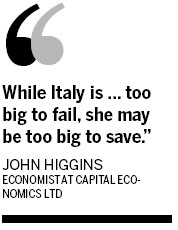Investors question eurozone future
Updated: 2011-11-11 07:37
(China Daily)
|
|||||||||
PARIS - The euro-region's defenses are being breached. Investors on Wednesday propelled Italy's 10-year bond yield to close at a euro-era high of 7.25 percent after the promised exit of Prime Minister Silvio Berlusconi failed to convince them that his country can slash Europe's second-largest debt burden.
The biggest signal yet that the currency's third-largest economy is falling prey to its two-year debt crisis forces German Chancellor Angela Merkel, European Central Bank (ECB) President Mario Draghi and their peers to decide just how far they're willing to go to defend the euro.
"The market is testing the commitment of the eurozone's stewards," said Eric Chaney, Paris-based chief economist at insurer AXA SA and a former official in the French Finance Ministry. "Italy is the real crisis battleground."
At 1.9 trillion euros ($2.6 trillion), Italy's debt exceeds that of Greece, Spain, Portugal and Ireland combined, though unlike those nations, it has systemic importance as the world's third-largest bond market and eighth-biggest economy.
 |
The euro fell to as low as $1.3515 on Thursday, its weakest since Oct 10. The yield on Italy's 10-year bond on Wednesday surged to levels that previously drove Greece, Ireland and Portugal to seek international bailouts.
"While Italy is considered too big to fail, she may be too big to save unless there is a major change of attitude towards resolving the crisis," said John Higgins, an economist at Capital Economics Ltd. "Things could be about to turn very ugly."
Investors want "a signal that Italy has taken control of its accounts and is increasing the competitiveness of the system", Marco Tronchetti Provera, chairman of Pirelli & C. SpA told reporters on Wednesday.
"This is a form of meltdown," said Marc Ostwald, a fixed-income strategist at Monument Securities Ltd. "I would imagine the telephones between international finance ministries and central banks are in danger of running so hot they'll melt down themselves."
Failure to restore order may leave Italy joining Greece, Portugal and Ireland in seeking outside help. The first port of call would likely be the 440-billion-euro European Financial Stability Facility (EFSF). A country can now tap a precautionary promise of support of up to 10 percent of its GDP - about 160 billion euros in Italy's case.
A problem is that the rescue fund has about 270 billion euros left after subtracting commitments to Greece, Portugal and Ireland. With Italy facing maturing bonds of about 475 billion euros in the next three years, Citigroup Inc and Royal Bank of Scotland Group PLC are among those saying the fund needs at least double that amount to insulate Italy and Spain.
There is mounting pressure on the Frankfurt-based ECB - now helmed by the Italian Draghi - to bolster a bond-buying program to ease Italy's strains. Another proposal is for the central bank to provide an unlimited guarantee of Italy's debt in the hope that would remind investors it's struggling with liquidity, not insolvency, and to buy it time to pass debt-reducing policies.
"The house is on fire," said Dante Roscini, a lecturer at Harvard Business School and former chief executive officer of Morgan Stanley. "The ECB needs to print money and buy Italian bonds, it's the only way to put the fire out."
"Eventually they'll get to that point where they have to press print," said Eoin Fahy, chief economist at Kleinwort Benson Investors. "The question is, do they throw Greece to the wolves first?"
Andrew Bosomworth, a senior portfolio manager at Pacific Investment Management Co in Munich, senses a "watershed moment". With Italy all but locked out of markets, European officials may have to jettison their short-term firefighting and pick between a smaller, stronger eurozone or a federalist structure with greater cross-border support.
"What is happening is what they've been trying to stop," said Bosomworth, a former ECB economist.
Bloomberg News











